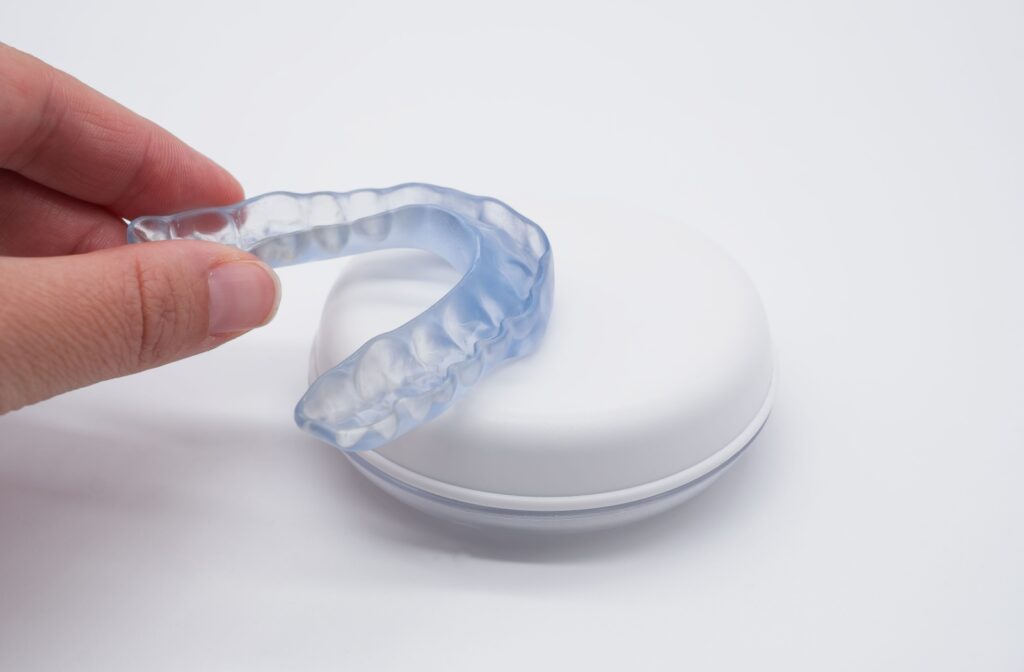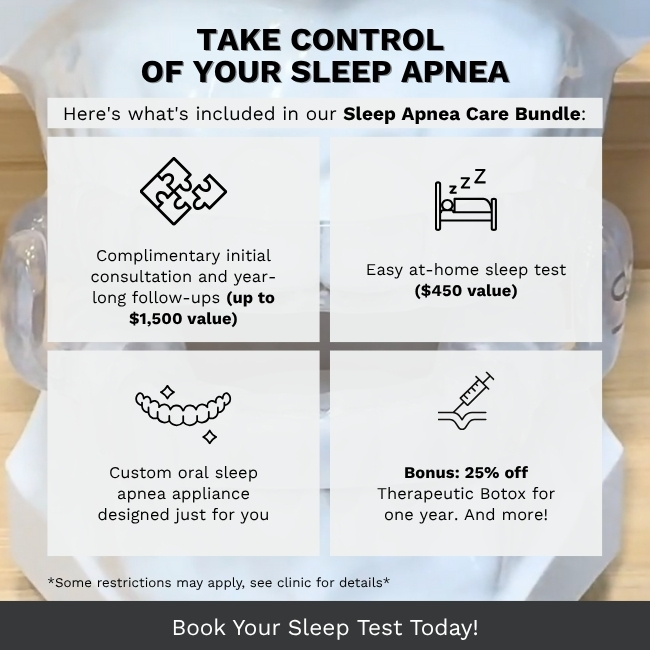10 Things That Make TMJ Disorder Worse & Treatment Options

Your temporomandibular joints (TMJs) are small but powerful hinges that help you chew, speak, yawn, and swallow. When they’re working well, you don’t even notice them. But for those experiencing TMJ disorder, jaw movement can become uncomfortable or even painful. Symptoms include jaw clicking, stiffness, headaches, or discomfort around the ears and temples.
There are a variety of reasons someone might develop TMJ disorder, including joint misalignment, bruxism (grinding or clenching), past injury, or arthritis. While the underlying causes vary, many everyday habits and behaviours can aggravate the condition further.
Understanding what makes TMJ symptoms worse is the first step in managing them; and knowing when to seek care.
What Is TMJ Disorder?
The temporomandibular joints sit just in front of each ear and connect the lower jaw to the skull. These joints are surrounded by muscles, ligaments, and cartilage that help them move smoothly. TMJ disorder occurs when these components stop functioning harmoniously, often resulting in:
- Clicking or popping sounds while moving the jaw
- Jaw locking or limited range of motion
- Earaches, temple aches, or facial pain
- Neck tension and headaches
- Difficulty chewing or speaking
- Tinnitus and fullness or pressure in and around the ear
Because the jaw is so integral to everyday activity, any disruption can feel especially invasive. Fortunately, many contributing factors can be addressed directly.
What Makes TMJ Disorder Worse?
It’s like a hip or a knee. We can overuse and abuse it.
Certain repetitive actions, postural habits, or lifestyle choices can increase pressure on the jaw joints. Left unchecked, these factors may prolong healing or intensify symptoms.
1. Stress & Jaw Tension
We carry a lot of stress in the jaw. Emotional stress often manifests physically and for many people, that includes clenching the jaw or grinding teeth. Chronic tension in the facial muscles can make TMJ symptoms more intense and harder to manage.
Exploring stress management tools like meditation, light exercise, or journaling may help reduce the physical effects of anxiety on the jaw.
2. Biting Habits
Chewing on non-food items, such as pens, fingernails, or even ice, can introduce irregular stress on the jaw. These habits tend to occur unconsciously, especially during periods of stress or boredom.
Being mindful of when these actions take place, like while working or watching TV, can help you gradually phase them out.
3. Teeth Grinding & Clenching
Bruxism is one of the most common contributors to TMJ pain. Whether it happens during the day or while sleeping, the intense pressure it places on the jaw muscles and joints can cause long-term strain.
Common signs of bruxism include:
- Jaw soreness in the morning
- Worn-down teeth
- Chronic headaches
- Tooth sensitivity
- Multiple root canal treatments and/or fractured teeth
4. Using Your Teeth as Tools
Tearing into plastic packaging, cracking nuts, or opening bottles with your teeth may seem convenient, but these behaviours can injure the supporting structures of your jaw over time. It’s important to stick to proper tools and avoid putting unnecessary force on your jaw.
5. Chewing Gum or Tough Foods
Gum chewing, especially for long durations, keeps the jaw engaged without rest. Similarly, frequently eating hard or chewy foods can strain already irritated joints.
Foods to consider limiting include:
- Jerky
- Raw carrots or celery
- Crusty breads and bagels
- Nuts and seeds
Opt for softer, easier-to-chew alternatives when your symptoms flare up.
6. Oversized Bites
Taking large bites of dense foods can force the jaw into extreme ranges of motion. Over time, this can aggravate the temporomandibular joint. Cutting food into smaller, bite-sized pieces allows your jaw to move within a more comfortable range.
7. Sleep Positioning
Sleeping on your stomach or with your face pressed into a pillow can misalign the jaw during rest. Side sleeping with your hand tucked under your cheek may also contribute to uneven pressure. Training yourself to sleep on your back can reduce nighttime tension.
8. Slouching or Poor Posture
Body posture impacts jaw posture. When the head leans forward, common while texting or working at a desk, the lower jaw tends to move back, putting pressure on the joints. Maintaining good posture throughout the day can relieve unnecessary strain. Keep your head up.
9. Improper Use of Dental Devices
Traditional nightguards can be uncomfortable for TMJ disordered patients. Especially if they have snoring or sleep apnea disordered breathing when they sleep. Therapeutic mouthguards, bite splints, or dentures need to fit precisely to be effective. When they don’t, they can make symptoms worse. If your device feels uncomfortable or doesn’t seem to be helping, it’s important to have it assessed and re-engineered if needed. Dentures need to fit precisely to be effective.
10. Skipping Preventive Dental Care
Missing regular checkups may allow bite problems or early signs of TMJ disorder to go undetected. Preventive care visits are a chance to assess your jaw’s function, review your symptoms, and explore custom-fit treatment options before things escalate.

Treatment Options for TMJ Disorder
TMJ disorder doesn’t always require invasive intervention. For many, a combination of professional guidance and lifestyle modifications can significantly improve comfort and jaw function.
Professional Interventions
Treatment may include:
- Custom TMJ nightguards. These are engineered differently than traditional nightguards
- Targeted physical therapy to stretch and retrain the jaw and tongue muscles
- Orthodontic corrections for misaligned bites
- Digital scans or jaw tracking to map joint movement
- Therapeutic neuromodulator injections or anti-inflammatory medications during flare-ups
Surgical interventions are generally reserved for complex cases where conservative options haven’t helped.
TMJ Relief with Oral Appliances & Neuromodulator Injections
You can also try custom oral appliances and therapeutic neuromodulator injections as a treatment option for TMJ disorder. Neuromodulator injections can be used to help relax overactive jaw muscles that contribute to clenching, grinding, and facial tension. By temporarily reducing muscle activity, neuromodulator injections may relieve pain and improve jaw function without altering your bite.
Thoughtful, Preventive TMJ Care
Left alone, TMJ pain can eventually rob you of every emotion in your body.
Living with TMJ disorder doesn’t mean resigning yourself to discomfort. The key lies in identifying contributing habits, making thoughtful lifestyle adjustments, and working with professionals who can offer personalized care based on your jaw’s specific needs.
At Northwest Dental Centre, we take a comprehensive and preventive approach to dentistry, including the care of TMJ disorders. If you’re navigating jaw pain or curious about your options, we invite you to visit us and experience dentistry built around you. You don’t need a referral to come and see us for TMJ care.


